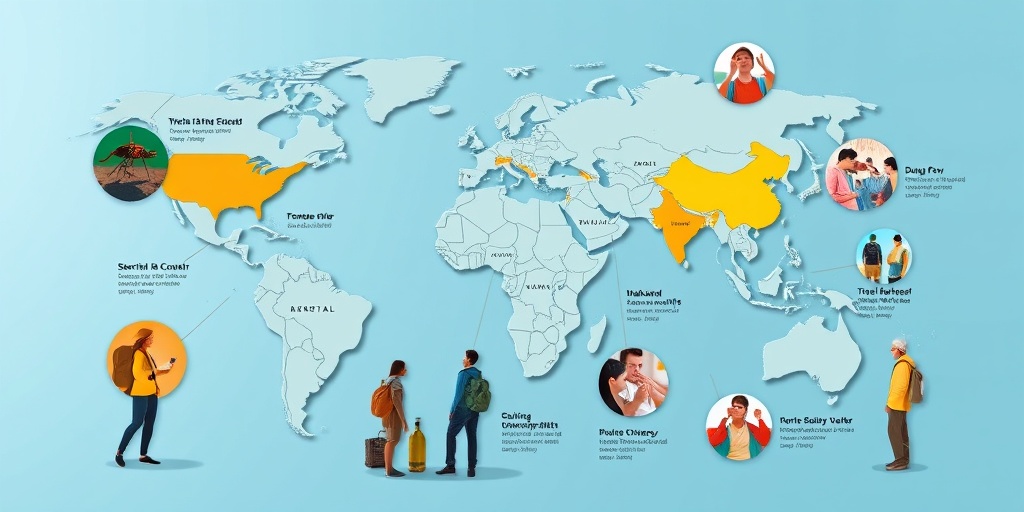What Is Travel Health?
Travel health refers to the branch of health care that focuses on the health risks associated with international travel. It encompasses a wide range of topics, including vaccinations, health insurance, and preventive measures to ensure travelers remain healthy during their journeys. With the world becoming more interconnected, understanding travel health is essential for anyone planning to explore new destinations.
The Importance of Travel Health
When you travel, you expose yourself to different environments, cultures, and health risks. This is why prioritizing travel health is crucial. Here are some key reasons why:
- Preventing Illness: Certain regions may have diseases that are uncommon in your home country. Vaccinations and preventive medications can help protect you.
- Access to Care: Knowing where to find medical assistance in a foreign country can be vital in case of emergencies.
- Travel Health Insurance: Having the right insurance can cover unexpected medical expenses, ensuring you receive the care you need without financial strain.
Key Components of Travel Health
To ensure a safe and healthy trip, consider the following components of travel health:
- Vaccinations: Depending on your destination, you may need specific vaccinations. Consult with a healthcare provider to determine what is necessary.
- Travel Health Insurance: This is essential for covering medical expenses abroad. Options vary, so research plans that suit your travel needs, such as travel health insurance for Schengen visa or travel health insurance Germany from India.
- Health Precautions: Carry a travel health kit with basic medications, first-aid supplies, and any personal medications you may need.
Travel Health Risks
While traveling can be an enriching experience, it also comes with its share of health risks. Understanding these risks can help you take proactive measures to protect yourself.
Common Travel Health Risks
Here are some of the most common health risks travelers may encounter:
- Infectious Diseases: Diseases such as malaria, dengue fever, and typhoid can be prevalent in certain areas. Research your destination to understand the risks and necessary vaccinations.
- Food and Water Safety: Consuming contaminated food or water can lead to gastrointestinal issues. Always opt for bottled water and eat at reputable establishments.
- Altitude Sickness: Traveling to high altitudes can cause altitude sickness. Acclimatization and hydration are key to preventing this condition.
- Injury: Accidents can happen anywhere. Be cautious while engaging in activities and ensure you have adequate insurance coverage.
Mitigating Travel Health Risks
To minimize your exposure to health risks while traveling, consider the following strategies:
- Consult a Travel Health Specialist: Before your trip, visit a healthcare provider who specializes in travel medicine. They can provide tailored advice based on your destination.
- Stay Informed: Keep up-to-date with health advisories and travel restrictions related to your destination.
- Practice Good Hygiene: Regular handwashing and using hand sanitizer can help prevent the spread of germs.
- Invest in Travel Health Insurance: Ensure you have comprehensive coverage that includes medical emergencies, especially if you’re traveling internationally.
In conclusion, understanding travel health is essential for any traveler. By being aware of potential health risks and taking preventive measures, you can enjoy your adventures with peace of mind. For more information on travel health and to find evidence-based health answers, consider visiting Yesil Health AI. Safe travels! 🌍✈️

Travel Vaccinations
When planning your next adventure, one of the most crucial aspects to consider is travel vaccinations. These vaccinations are essential for protecting your health while exploring new destinations. Different countries have varying health risks, and being informed about the necessary vaccinations can help you avoid serious illnesses.
Why Are Travel Vaccinations Important?
Travel vaccinations are designed to protect you from diseases that are more prevalent in certain regions. For instance, diseases like yellow fever, hepatitis A, and typhoid fever are common in many parts of the world. By getting vaccinated, you not only safeguard your health but also contribute to the overall health of the communities you visit.
Common Travel Vaccinations
- Hepatitis A: Recommended for travelers to many countries, especially where sanitation is poor.
- Typhoid Fever: Important for those traveling to areas with contaminated food and water.
- Yellow Fever: Required for entry into certain countries in Africa and South America.
- Rabies: Recommended for travelers who may come into contact with animals.
- COVID-19: Stay updated on vaccination requirements as they vary by destination.
When to Get Vaccinated
Timing is key when it comes to travel vaccinations. It’s advisable to consult with a healthcare provider at least 4-6 weeks before your trip. This allows enough time for vaccines to take effect and for you to receive any necessary booster shots.
Where to Get Vaccinated
Most travel clinics, primary care physicians, and public health departments offer travel vaccinations. Some pharmacies also provide these services. Make sure to check if your insurance covers travel vaccinations, as this can vary widely.
Travel Health Insurance
Another vital component of travel health is securing adequate travel health insurance. This insurance protects you from unexpected medical expenses while traveling, ensuring that you can receive the care you need without financial strain.
Why You Need Travel Health Insurance
Travel health insurance is essential for several reasons:
- Medical Emergencies: Accidents and illnesses can happen anywhere. Insurance helps cover hospital stays, surgeries, and emergency evacuations.
- Trip Cancellation: If you need to cancel your trip due to unforeseen circumstances, travel insurance can reimburse you for non-refundable expenses.
- Lost or Stolen Belongings: Insurance can help recover costs for lost luggage or stolen items.
Types of Travel Health Insurance
There are various types of travel health insurance plans available:
- Single Trip Insurance: Covers one specific trip, ideal for occasional travelers.
- Annual Multi-Trip Insurance: Best for frequent travelers, this plan covers multiple trips within a year.
- Long-Term Travel Insurance: Suitable for those traveling for extended periods, often covering several months or even years.
Choosing the Right Travel Health Insurance
When selecting a travel health insurance plan, consider the following:
- Coverage Limits: Ensure the plan covers a sufficient amount for medical expenses.
- Pre-existing Conditions: Check if the policy covers any pre-existing health issues.
- Emergency Evacuation: Look for plans that include coverage for emergency evacuations, especially if traveling to remote areas.
Travel Health Insurance for Specific Regions
Different regions may have specific requirements for travel health insurance. For example:
- Travel Health Insurance for Schengen Visa: Many European countries require proof of insurance for visa applications.
- Travel Health Insurance in Germany: If you’re visiting Germany, ensure your insurance meets local regulations.
- Travel Health Insurance from India: Indian travelers should look for plans that cover international travel adequately.
In conclusion, prioritizing travel vaccinations and securing appropriate travel health insurance are essential steps in ensuring a safe and enjoyable journey. By taking these precautions, you can focus on making memories rather than worrying about health risks. 🌍✈️

Travel Health Tips
Traveling can be one of the most enriching experiences of your life, but it also comes with its own set of health challenges. Whether you’re heading to a tropical paradise or a bustling city, keeping your health in check is crucial. Here are some essential travel health tips to ensure you have a safe and enjoyable journey. 🌍✈️
1. Research Your Destination
Before you embark on your adventure, take the time to research the health risks associated with your destination. Some countries may have specific health advisories, such as outbreaks of diseases like malaria or Zika virus. Websites like the Centers for Disease Control and Prevention (CDC) and the World Health Organization (WHO) provide valuable information on health risks and recommended vaccinations.
2. Get Vaccinated
Vaccinations are a vital part of travel health. Depending on your destination, you may need to get vaccinated against diseases such as hepatitis A, typhoid, or yellow fever. Consult with your healthcare provider at least 4-6 weeks before your trip to ensure you have enough time to get vaccinated and for the vaccines to take effect.
3. Pack a Travel Health Kit
Having a well-stocked travel health kit can save you from minor health issues while on the road. Here’s what to include:
- First Aid Supplies: Band-aids, antiseptic wipes, and gauze.
- Medications: Pain relievers, antihistamines, and any prescription medications.
- Insect Repellent: Especially important for tropical destinations.
- Sunscreen: Protect your skin from harmful UV rays.
4. Stay Hydrated
Staying hydrated is crucial, especially when traveling to hot climates or engaging in physical activities. Drink plenty of water and avoid excessive alcohol consumption, which can lead to dehydration. If you’re unsure about the water quality, opt for bottled water to stay safe.
5. Practice Food Safety
Foodborne illnesses can ruin your trip. To minimize the risk:
- Eat at reputable restaurants.
- Avoid street food unless you can see it being prepared fresh.
- Choose cooked foods over raw.
Traveling with Medications
If you take medications regularly, traveling can present unique challenges. Here are some tips to ensure you manage your medications effectively while on the go. 💊🌏
1. Carry a Doctor’s Note
When traveling with medications, especially controlled substances, it’s wise to carry a doctor’s note. This note should outline your medical condition and the necessity of your medications. It can help avoid any issues at customs or security checkpoints.
2. Keep Medications in Original Packaging
Always keep your medications in their original packaging, which includes the prescription label. This helps to identify the medication and proves that it is legally prescribed to you. It also makes it easier to manage dosages and instructions while traveling.
3. Pack Extra Medications
Accidents happen, and you may lose your luggage or run out of medication. Always pack extra doses of your medications in your carry-on bag. This ensures you have access to them even if your checked luggage is delayed or lost.
4. Know the Regulations
Different countries have varying regulations regarding medications. Before you travel, research the laws of your destination regarding the importation of medications. Some countries may prohibit certain medications, even if they are legal in your home country.
5. Consider Travel Health Insurance
Investing in travel health insurance is a smart move, especially if you have pre-existing conditions or are traveling to a country with high healthcare costs. Look for policies that cover medical emergencies, trip cancellations, and lost medications. This can provide peace of mind and financial protection during your travels.
By following these travel health tips and being mindful of your medications, you can enjoy your travels while keeping your health in check. Safe travels! 🌟

Travel Health Resources
When planning a trip, ensuring your travel health is a top priority. Whether you’re heading to a tropical paradise or a bustling city, having the right resources can make all the difference in your travel experience. Here are some essential resources to consider:
1. Travel Health Insurance
One of the most critical aspects of travel health is securing adequate travel health insurance. This insurance protects you from unexpected medical expenses while abroad. Here are some key points to keep in mind:
- Coverage Types: Look for policies that cover medical emergencies, trip cancellations, and lost luggage.
- Destination-Specific Plans: If you’re traveling to Germany or any Schengen area country, consider plans specifically designed for those regions, such as travel health insurance for Schengen visa.
- International Coverage: Ensure your plan covers international travel, especially if you’re traveling from India to the USA or Europe.
2. Vaccination and Health Advisory Resources
Before you travel, it’s essential to check if any vaccinations are required or recommended for your destination. Resources like the Centers for Disease Control and Prevention (CDC) and the World Health Organization (WHO) provide up-to-date information on health advisories and vaccination requirements.
3. Local Healthcare Facilities
Research local healthcare facilities at your destination. Knowing where to find medical help can be crucial in case of an emergency. Websites like International SOS can help you locate nearby hospitals and clinics.
4. Travel Health Apps
In today’s digital age, several apps can assist you in managing your travel health. Some popular options include:
- Travel Health Pro: Offers health advice and vaccination information based on your travel itinerary.
- My Travel Health: Helps you keep track of your vaccinations and medications.
- HealthMap: Provides real-time health alerts and disease outbreaks in your travel area.
5. Travel Blogs and Forums
Engaging with travel blogs and forums can provide personal insights and tips from fellow travelers. Websites like Reddit and travel-specific forums can be excellent resources for advice on travel health and safety.
Post-Travel Health Checkups
After returning from your travels, it’s essential to prioritize your health. Post-travel health checkups can help identify any potential issues that may have arisen during your trip. Here’s what to consider:
1. Schedule a Checkup
It’s advisable to schedule a checkup with your healthcare provider within a few weeks of returning from your trip. This is especially important if you visited areas with known health risks or if you experienced any illness while traveling.
2. Monitor Symptoms
Be vigilant about any symptoms that may arise after your trip. Common post-travel symptoms to watch for include:
- Fever: Could indicate an infection or illness.
- Fatigue: While common after travel, excessive fatigue may require further investigation.
- Gastrointestinal Issues: Diarrhea or stomach pain can be signs of foodborne illnesses.
3. Discuss Vaccinations
During your checkup, discuss any necessary vaccinations or boosters that may be required based on your travel history. This is particularly important if you traveled to regions with endemic diseases.
4. Mental Health Considerations
Travel can be both exhilarating and exhausting. If you find yourself feeling anxious or depressed after your trip, consider speaking with a mental health professional. They can help you process your experiences and adjust back to daily life.
5. Share Your Experience
Sharing your travel experiences with friends, family, or online communities can be therapeutic. It can also help others prepare for their own travels by learning from your insights and health precautions.
By utilizing these travel health resources and prioritizing post-travel health checkups, you can ensure a safer and healthier travel experience. 🌍✈️

Frequently Asked Questions about Travel Health
What is Travel Health Insurance?
Travel health insurance is a type of insurance that covers medical expenses incurred while traveling. It is essential for ensuring that you receive necessary medical care without facing exorbitant costs abroad.
Why do I need Travel Health Insurance?
Having travel health insurance is crucial as it protects you from unexpected medical emergencies, trip cancellations, and other unforeseen events that could disrupt your travel plans. It provides peace of mind, allowing you to enjoy your trip without worrying about potential health issues.
What does Travel Health Insurance typically cover?
- Emergency medical expenses
- Hospitalization costs
- Medical evacuation
- Trip cancellation or interruption
- Lost or stolen belongings
How do I choose the right Travel Health Insurance?
When selecting travel health insurance, consider the following factors:
- Your destination and its healthcare system
- The duration of your trip
- Your personal health needs and pre-existing conditions
- Coverage limits and exclusions
- Customer reviews and claims process
Is Travel Health Insurance necessary for Schengen Visa?
Yes, if you are applying for a Schengen visa, you are required to have travel health insurance that covers at least €30,000 in medical expenses. This insurance must be valid in all Schengen countries.
Can I purchase Travel Health Insurance from India for my trip to Germany?
Absolutely! Many insurance providers offer travel health insurance plans specifically designed for travelers from India heading to Germany. Ensure that the policy meets the requirements for your visa application.
What should I do if I need medical assistance while traveling?
If you require medical assistance while traveling, contact your travel health insurance provider immediately. They can guide you to the nearest medical facility and assist with the claims process.
How can I file a claim with my Travel Health Insurance?
To file a claim, gather all necessary documentation, including medical reports, receipts, and your insurance policy details. Contact your insurance provider for specific instructions on the claims process.
Are there any exclusions in Travel Health Insurance policies?
Yes, most travel health insurance policies have exclusions. Common exclusions include pre-existing conditions, high-risk activities (like extreme sports), and travel to certain countries. Always read the policy details carefully.
How much does Travel Health Insurance cost?
The cost of travel health insurance varies based on factors such as your age, destination, duration of travel, and coverage limits. It’s advisable to compare different plans to find one that fits your budget and needs.
Can I get Travel Health Insurance for international travel?
Yes, many insurance companies offer travel health insurance plans that cover international travel. Ensure that the policy provides adequate coverage for the countries you plan to visit.




